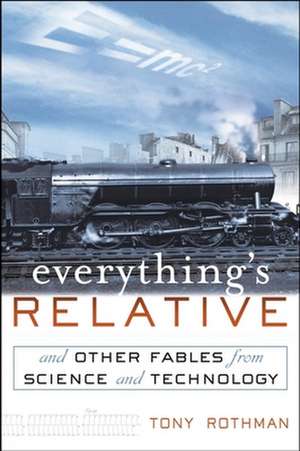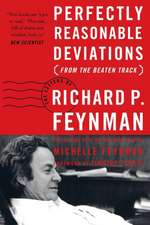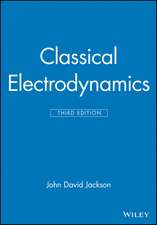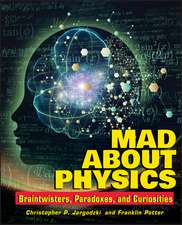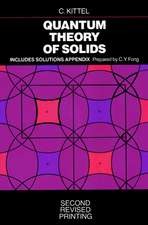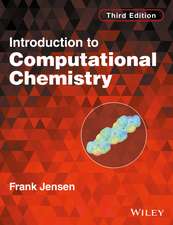Everything's Relative: And Other Fables from Science and Technology
Autor Tony Rothmanen Limba Engleză Hardback – 9 oct 2003
Morse invented the telegraph, Bell the telephone, Edison the light bulb, and Marconi the radio . . . right? Well . . . the truth is slightly more complicated. The history of science and technology is riddled with apocrypha, inaccuracies, and falsehoods, and physicist Tony Rothman has taken it upon himself to throw a monkey wrench into the works. Combining a storyteller′s gifts with a scientist′s focus and hardheaded devotion to the facts–such as they may be–Rothman breaks down many of the most famous "just–so" stories of physics, astronomy, chemistry, biology, and technology to give credit where credit is truly due. From Einstein′s possible misunderstanding of his own theories to actress Hedy Lemarr′s role in the invention of the radio–controlled torpedo, he dredges his way through the legends of science history in relating the fascinating stories behind some of the most important, and often unsung, breakthroughs in science.
Tony Rothman, PhD (Bryn Mawr, PA), is a Research Associate at Bryn Mawr College. He is the author of seven other critically acclaimed science books and a frequent contributor to leading science publications, including Scientific American and Discover.
Preț: 141.86 lei
Nou
Puncte Express: 213
Preț estimativ în valută:
27.15€ • 28.41$ • 22.59£
27.15€ • 28.41$ • 22.59£
Carte disponibilă
Livrare economică 10-24 martie
Preluare comenzi: 021 569.72.76
Specificații
ISBN-13: 9780471202578
ISBN-10: 0471202576
Pagini: 272
Dimensiuni: 160 x 237 x 25 mm
Greutate: 0.52 kg
Editura: Wiley
Locul publicării:Hoboken, United States
ISBN-10: 0471202576
Pagini: 272
Dimensiuni: 160 x 237 x 25 mm
Greutate: 0.52 kg
Editura: Wiley
Locul publicării:Hoboken, United States
Public țintă
Science history readers. The author was a writer for Discover and editor at Scientific American; the book should appeal to both magazines′ audiences.Descriere
Stand on the shoulders of giants and discover the real stories behind many of the most cherished "facts" in science history Forget everything you learned in school. Abandon the sound–bitten histories of textbooks. Disregard the articles you read in your favorite magazines. The history of science is riddled with errors and misconceptions. Facts have been whitewashed by narcissism and nationalism. Brilliant scientists, burdened by procrastination, have practically handed credit for their discoveries over to their more ambitious nemeses. In Everything’s Relative, Tony Rothman debunks centuries of commonly held beliefs to reveal the real truths behind the greatest moments in science.
From Einstein’s possible misunderstanding of his own theories to actress Hedy Lemarr’s role in the invention of the radio–controlled torpedo, Everything’s Relative barrels through centuries of legends to reveal the even more fascinating stories behind some of the most important breakthroughs in science.
Some of the surprising truths revealed include:
From Einstein’s possible misunderstanding of his own theories to actress Hedy Lemarr’s role in the invention of the radio–controlled torpedo, Everything’s Relative barrels through centuries of legends to reveal the even more fascinating stories behind some of the most important breakthroughs in science.
Some of the surprising truths revealed include:
- Henry Young, the American inventor, discovered radio waves a full half–century before Heinrich Hertz
- Abel Niepce de Saint Victor discovered radioactivity forty years before Henri Becquerel
- The cotton gin existed in India and Asia long before Eli Whitney claimed to have invented it
- Thomas Edison did not invent the first incandescent bulb; he invented the first practical one
- The Koreans invented moveable type half a century before Johannes Gutenberg
Textul de pe ultima copertă
Stand on the shoulders of giants and discover the real stories behind many of the most cherished "facts" in science history Forget everything you learned in school. Abandon the sound–bitten histories of textbooks. Disregard the articles you read in your favorite magazines. The history of science is riddled with errors and misconceptions. Facts have been whitewashed by narcissism and nationalism. Brilliant scientists, burdened by procrastination, have practically handed credit for their discoveries over to their more ambitious nemeses. In Everything’s Relative, Tony Rothman debunks centuries of commonly held beliefs to reveal the real truths behind the greatest moments in science.
From Einstein’s possible misunderstanding of his own theories to actress Hedy Lemarr’s role in the invention of the radio–controlled torpedo, Everything’s Relative barrels through centuries of legends to reveal the even more fascinating stories behind some of the most important breakthroughs in science.
Some of the surprising truths revealed include:
From Einstein’s possible misunderstanding of his own theories to actress Hedy Lemarr’s role in the invention of the radio–controlled torpedo, Everything’s Relative barrels through centuries of legends to reveal the even more fascinating stories behind some of the most important breakthroughs in science.
Some of the surprising truths revealed include:
- Henry Young, the American inventor, discovered radio waves a full half–century before Heinrich Hertz
- Abel Niepce de Saint Victor discovered radioactivity forty years before Henri Becquerel
- The cotton gin existed in India and Asia long before Eli Whitney claimed to have invented it
- Thomas Edison did not invent the first incandescent bulb; he invented the first practical one
- The Koreans invented moveable type half a century before Johannes Gutenberg
Cuprins
Preface. Lapses, Sources, and Acknowledgments.
I. THE DOMAIN OF PHYSICS AND ASTRONOMY.
1. The Mafia Invents the Barometer.
2. The Riddle of the Sphinx: Thomas Young s Experiment.
3. Joseph Henry and the (Near) Discovery of (Nearly) Everything.
4. Neptune: The Greatest Triumph in the History of Astronomy, or the Greatest Fluke?
5. Invisible Light: The Discovery of Radioactivity.
6. Light, Ether, Corpuscles, and Charge: The Electron.
7. Einstein s Miraculous Year (and a Few Others).
8. What Did the Eclipse Expedition Really Show? And Other Tales of General Relativity.
9. Two Quantum Tales: Bohr and Hydrogen, Dirac and the Positron.
10. A Third Quantum Tale: Southpaw Electrons and Discounted Luncheons.
II. THE DOMAIN OF TECHNOLOGY.
11. What Hath God Wrought? Shadows of Forgotten Ancestors, Samuel Morse, and the Telegraph.
12. Fiat Lux: Edison, the Incandescent Bulb, and a Few Other Matters.
13. Magna Est Veritas et Praevalet : The Telephone.
14. A Babble of Incoherence: The Wireless Telegraph, a.k.a. Radio.
15. Mind–Destroying Rays: Television.
16. Plausibility: The Invention of Secret Electronic Communication.
III. THE DOMAIN OF CHEMISTRY AND BIOLOGY.
17. The Evolution of Evolution: Erasmus, Charles, Gregor, and Ronald.
18. Dreams with Open Eyes: Kekulé, Benzene, and Loschmidt.
19. Chance, Good and Bad: Penicillin.
IV. THE DOMAIN OF MATHEMATICS: CLOSED FOR RENOVATION.
References and Notes.
Index.
I. THE DOMAIN OF PHYSICS AND ASTRONOMY.
1. The Mafia Invents the Barometer.
2. The Riddle of the Sphinx: Thomas Young s Experiment.
3. Joseph Henry and the (Near) Discovery of (Nearly) Everything.
4. Neptune: The Greatest Triumph in the History of Astronomy, or the Greatest Fluke?
5. Invisible Light: The Discovery of Radioactivity.
6. Light, Ether, Corpuscles, and Charge: The Electron.
7. Einstein s Miraculous Year (and a Few Others).
8. What Did the Eclipse Expedition Really Show? And Other Tales of General Relativity.
9. Two Quantum Tales: Bohr and Hydrogen, Dirac and the Positron.
10. A Third Quantum Tale: Southpaw Electrons and Discounted Luncheons.
II. THE DOMAIN OF TECHNOLOGY.
11. What Hath God Wrought? Shadows of Forgotten Ancestors, Samuel Morse, and the Telegraph.
12. Fiat Lux: Edison, the Incandescent Bulb, and a Few Other Matters.
13. Magna Est Veritas et Praevalet : The Telephone.
14. A Babble of Incoherence: The Wireless Telegraph, a.k.a. Radio.
15. Mind–Destroying Rays: Television.
16. Plausibility: The Invention of Secret Electronic Communication.
III. THE DOMAIN OF CHEMISTRY AND BIOLOGY.
17. The Evolution of Evolution: Erasmus, Charles, Gregor, and Ronald.
18. Dreams with Open Eyes: Kekulé, Benzene, and Loschmidt.
19. Chance, Good and Bad: Penicillin.
IV. THE DOMAIN OF MATHEMATICS: CLOSED FOR RENOVATION.
References and Notes.
Index.
Recenzii
its real strength is the way it rehabilitates some of the great unknowns in scientific history (Focus, May 2004) The writing is witty, scientifically sound, and unburdened with extensive footnotes and literature references. (The Alchemist, 26 March 2004)
informative and well researched, this is a surprisingly new look at some very old stories. (Good Book Guide, April 2004)
"It′s hard to think of a more wonderful science writer than Tony Rothman." (San Francisco Examiner)
"Tony Rothman is...a physicist who writes well and lucidly. His Hallmark is a rare attention to detail combined with abhorrence of any hint of condescension and an emphasis on the lighter side of physics." (Joseph Silk, Science magazine)
"...enthralling..." (New Scientist, 17 January 2004)
its real strength is the way it rehabilitates some of the great unknowns in scientific history (Focus, May 2004) The writing is witty, scientifically sound, and unburdened with extensive footnotes and literature references. (The Alchemist, 26 March 2004)
informative and well researched, this is a surprisingly new look at some very old stories. (Good Book Guide, April 2004)
"It′s hard to think of a more wonderful science writer than Tony Rothman." (San Francisco Examiner)
"...enthralling..." (New Scientist, 17 January 2004)
informative and well researched, this is a surprisingly new look at some very old stories. (Good Book Guide, April 2004)
"It′s hard to think of a more wonderful science writer than Tony Rothman." (San Francisco Examiner)
"Tony Rothman is...a physicist who writes well and lucidly. His Hallmark is a rare attention to detail combined with abhorrence of any hint of condescension and an emphasis on the lighter side of physics." (Joseph Silk, Science magazine)
"...enthralling..." (New Scientist, 17 January 2004)
its real strength is the way it rehabilitates some of the great unknowns in scientific history (Focus, May 2004) The writing is witty, scientifically sound, and unburdened with extensive footnotes and literature references. (The Alchemist, 26 March 2004)
informative and well researched, this is a surprisingly new look at some very old stories. (Good Book Guide, April 2004)
"It′s hard to think of a more wonderful science writer than Tony Rothman." (San Francisco Examiner)
"...enthralling..." (New Scientist, 17 January 2004)
Notă biografică
TONY ROTHMAN is a physicist and writer. He is the author of seven other critically acclaimed science books and a frequent contributor to leading science publications, including Scientific American and Discover.
